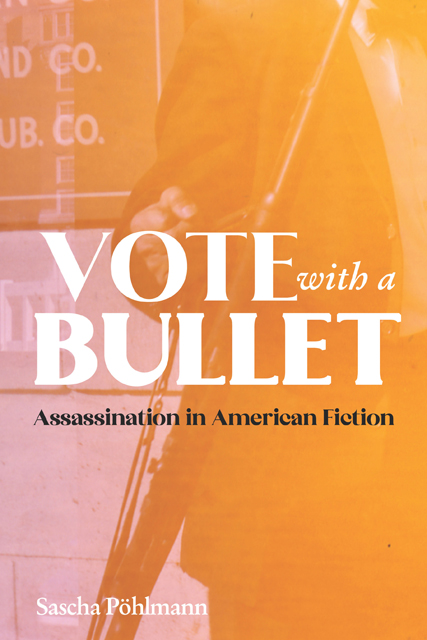Book contents
- Frontmatter
- Dedication
- Contents
- Introduction: The Individual and Society
- 1 The Princess Casamassima (1886)
- 2 The Assassination Bureau, Ltd. (1910/63)
- 3 All the King’s Men (1946)
- 4 Solar Lottery (1955)
- 5 The Manchurian Candidate (1959)
- 6 The Parallax View (1970)
- 7 Libra (1988)
- 8 The Dead Zone (1979)
- 9 11/22/63 (2011)
- 10 Big If (2002)
- 11 Checkpoint (2004)
- 12 The Good Father (2012)
- Conclusion
- Works Cited
- Index
7 - Libra (1988)
Published online by Cambridge University Press: 14 January 2023
- Frontmatter
- Dedication
- Contents
- Introduction: The Individual and Society
- 1 The Princess Casamassima (1886)
- 2 The Assassination Bureau, Ltd. (1910/63)
- 3 All the King’s Men (1946)
- 4 Solar Lottery (1955)
- 5 The Manchurian Candidate (1959)
- 6 The Parallax View (1970)
- 7 Libra (1988)
- 8 The Dead Zone (1979)
- 9 11/22/63 (2011)
- 10 Big If (2002)
- 11 Checkpoint (2004)
- 12 The Good Father (2012)
- Conclusion
- Works Cited
- Index
Summary
Don DeLillo’s Libra further intensifies this tendency to complicate the individuality of the assassin, and it also thoroughly undermines the notion of the agency of the subject. This subversion is such a fundamental aspect of the novel that it is routinely addressed in critical works. Michael James Rizza, for example, argues that the text “displaces agency from the individual characters onto outside forces, dispersing it beyond the characters themselves and thus keeping certainty elusive in the end” (172), and Magali Cornier Michael shows that it “simultaneously presents and subverts a humanist notion of the subject as centered, rational, self-determining” (148). Most notably, Timothy Melley devotes a substantial section of Empire of Conspiracy to “the challenges the assassination poses to [a liberal] model of individualism and agency” (136), so that his more general demonstration of agency panic in the postwar novel finds its perfect example in Libra. While Libra is also exemplary of assassination fiction and thus must not be omitted from a discussion of the genre, it is also exceptional in the canon I assembled for this purpose with regard to its scholarly assessment. Libra is the only novel analyzed here that has received considerable critical attention with a strong focus on questions of agency and subjectivity. My discussion of assassination as a violent, extra-electoral condensation of a more general conflict between individual and society can thus refer to and build on a much more substantial reading tradition than in the other cases of assassination fiction. Since my own reading for this particular purpose is in tune with this very convincing tradition rather than at odds with it, the following chapter will be more concise so as to strike a balance between going over familiar territory and doing justice to the relevance of Libra in the generic continuum.
Libra is a postmodernist historical novel that tells the story not only of Lee Harvey Oswald and the conspiracy he finds himself part of but also that of Nicholas Branch, “a retired senior analyst of the Central Intelligence Agency, hired on contract to write the secret history of the assassination of President Kennedy.” Oswald is thus at the same time the protagonist of the narrative as well as an object of study; for the reader, he is both an actor and a “patsy” (L 401), a character and a historical figure only accessible through text and image.
- Type
- Chapter
- Information
- Vote with a BulletAssassination in American Fiction, pp. 103 - 112Publisher: Boydell & BrewerPrint publication year: 2021

